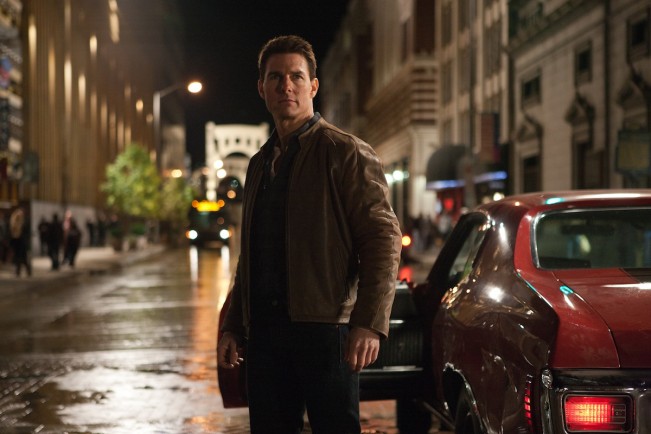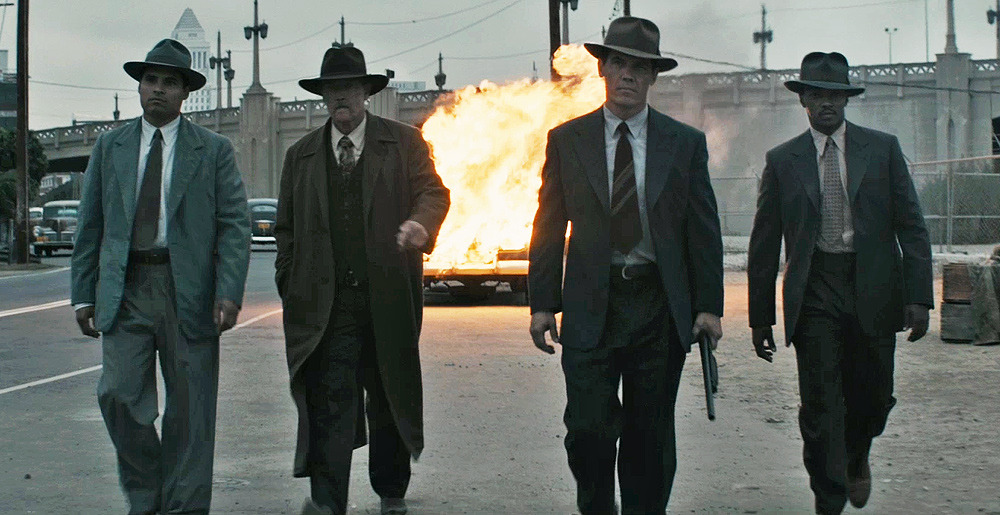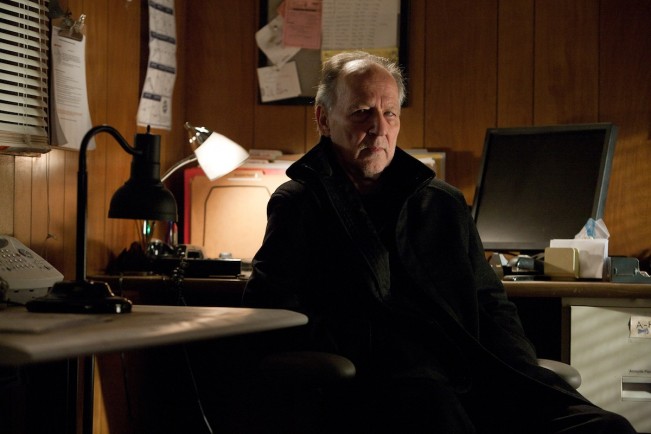

By Mike Wilmington Wilmington@moviecitynews.com
Wilmington on DVDs: The Red Menace; Jack Reacher; Gangster Squad
The Red Menace (One Star)
U.S.: R. G. Springsteen, 1949 (Olive)

Is The Red Menace really “The Reefer Madness of anti-Communist movies? Or is that flattering it? Too earnest to be funny, too serious to be camp, too boring to be effective propaganda, this Herbert Yates-produced doozy from Republic (for which it stands) is probably one of the worst of the post-war anti-Commie thrillers, entertainment-wise. It isn’t even dumb enough be dumb fun — since writers Albert Demond and Gerald Geraghty know something about their subject. They have dialogue about Hegel, and a Red temptress has a bookcase full of tomes by Marx and Engels.
But The Red Menace has its moments. The movie’s “hero” is vet Bill Jones. played by Robert Rockwell, who vecame a TV immortal as Eve Arden’s shy teacher beau Mr. Boynton on “Our Miss Brooks.” Here, Rockwell’s Bill is a hot-tempered ladies’ man, boiling mad at the Government’s mistreatment of Veterans. He‘s right. He‘s also ripe pickings for the local Communist recruiting center at the local bar — which has radical talent scouts and a cadre of Commie femme fatales (Betty Lou Gerson and Barbra Fuller as Yvonne Kraus and Mollie OFlaherty), with whom Bill dallies before settling down with the belle of the cell, Russian émigré Nina Petrovka (Hanne Axman). But never trust a Commie. Soon comrades ar dying like flies and Bill and Nina are on the run, in a faked highway scene that almost makes Detour look like Grand Prix.
The director, R.G. Springsteen, was a Republic regular, who mostly made westerns, but has one gem to his credit, the 1956 rural drama Come Next Spring, with Steve Cochran, Ann Sheridan. and Walter Brennan. He can’t do much for The Red Menace, noirish hokum that also boasts a duped African-American (Lester Luther), a fiery Italian-American who isn’t buying any dialectical materialism (Norman Budd), a persecuted, poliically incorrect Jewish poet (Shepard Menken) and a benevolent priest, Father O’Leary (Leo Cleary) who’s ready to forgive Mollie O’Flaherty and everybody else, including Demond and Geraghty. The solemn just-the-facts narration is by “Los Angeles City Council member” Lloyd G. Davies, who also doubles as the movie’s Immigration Chief.
If this show had a little more humor — in fact, if it had any humor at all — it might have won a place in film history as the first, or most typical, or most inane, of the Rom-Commie-Coms. But not even Eve Arden, Gale Gordon, Richard Crenna, and the whole “Our Miss Brooks” gang could pull a laugh out of this script — though at least, in The Red Menace, you get to see shy Mr. Boynton coming on strong. Marx should be such a ladykiller.
JACK REACHER (Two and a Half Stars)
U.S.: Christopher McQuarrie, 2012 (Paramount)
Jack Reacher, the new guns-blazing crime movie thriller, starring Tom Cruise as the seemingly invincible title hero, comes out at the worst possible time for a movie with a lot of firearms: in the aftermath of the Newtown gun massacre. But it would be an obnoxious and often unlikable show in any case, in any time — just not such an obvious one.
In any case, violence begets box-office, or so Hollywood often seems to believe—and Jack Reacher is an almost ridiculously violent movie, so ridiculous that if writer-director Christopher McQuarrie had dreamed up better jokes, and more of them, he might have had one hell of a comedy. Based on “One Shot,“ one of a series of crime novels by Lee Child about Reacher, a 6’5’’ behemoth of an ex-military dude who lives under the radar, and emerges to solve crimes maybe just for the hell of it (or, in this case, to prove he was right in a previous case), the movie stars Tom in a role more appropriate for Liam Neeson or Dwayne Johnson, The Artist Previously Known as The Rock. except why should Neeson have to play every 6’5” behemoth kicking the ass off dozens of bad guys and tearing apart another city? (Pittsburgh in this case.)
 The movie starts with a bang — five or six bangs actually, as a sniper blasts five strangers from a parking lot across from Pittsburgh‘s baseball stadium. When the wrong sniper (Joseph Sikora as Bart) is arrested for this crime, he calls out for Reacher (who arrested him for another shooting during the Iraq War), and goes into a coma, Reacher shows up anyway, convinced that Bart is guilty, and offers his investigative services to Bart’s attractive lawyer Helen Rodin, great great grand-daughter of the famous French sculptor Auguste Rodin. (The talented Helen put herself through Stanford law school by sculpting and mass-marketing statues of Arnold Schwarzenegger, thinking.)
The movie starts with a bang — five or six bangs actually, as a sniper blasts five strangers from a parking lot across from Pittsburgh‘s baseball stadium. When the wrong sniper (Joseph Sikora as Bart) is arrested for this crime, he calls out for Reacher (who arrested him for another shooting during the Iraq War), and goes into a coma, Reacher shows up anyway, convinced that Bart is guilty, and offers his investigative services to Bart’s attractive lawyer Helen Rodin, great great grand-daughter of the famous French sculptor Auguste Rodin. (The talented Helen put herself through Stanford law school by sculpting and mass-marketing statues of Arnold Schwarzenegger, thinking.)
No, sorry. I meant to say that Helen is the daughter of the famous Pittsburgh D.A. “Rody” Rodin (Richard Jenkins). Rodin is prosecuting Bart, and other mysterious characters are involved in some kind of conspiracy which will be revealed later. At that time, we will meet, to our astonishment, a cold, glassy-eyed maniac of a crime and business czar called The Zec, played by the great German filmmaker Werner Herzog—director, in better times, of Even Dwarfs Started Small, Aguirre: The Wrath of God, and The Mystery of Kaspar Hauser, or Every Man for Himself and God Against All. In this movie, the Zec earned his rep by chewing off the tops of his fingers to prevent death by frostbite and gangrene in Siberia (or somewhere like it)—which sounds like a scene in a Herzog movie, and probably tasted worse than the shoe Herzog had to eat after losing a bet to Errol Morris about Errol making his first movie. (Is that any less preposterous than the Rodin story?)
There’s also a car chase—the old-fashioned, non-digital kind—and several fights, one in a parking lot, often with guns. And, at the end, Robert Duvall shows up as Cash, a salty old Marine and jocular gun salesman, who gets in on the fight just for the hell of it—or so it appeared.
I didn’t like the movie very much, and not necessarily because of the heinous massacre in Newtown that preceded it. It’s just not a very good movie, even though, to their credit, the filmmakers try almost everything. Cruise takes his shirt off (and Pike complains). McQuarrie, who wrote very good, sharp, stylized dialogue for The Usual Suspects, seems to have decided to crank out stylized mediocre dialogue for a while, and who can blame him? Cruise plays Jack with a lot of charisma but no patented Cruise smiles — and who can blame him? He also tries hard to play six-five, but only manages five-ten, perhaps because Herzog forgot to bring along his dwarfs.
GANGSTER SQUAD (Two and a Half Stars)
U.S.: Ruben Fleischer, 2013 (Warner Bros.)

Gangster Squad is a well-produced but badly written crime movie depicting a 1949 war between gangster Mickey Cohen and a vigilante squad of undercover LAPD cops. Watching it brought back memories of the real Mickey Cohen, as I saw him on TV decades ago. He was a scary guy, but not in the psychopathic monster style with which Sean Penn sometimes amusingly plays him here. The real Mickey Cohen was scary because he seemed, in a funny way, so ordinary, so likable, like a tough uncle with lots of bloody but colorful war stories.
When I saw him, Cohen was on the Mike Douglas show, which had an afternoon slot, and he was talking about his meeting with Harry Cohn, the long-time head of Columbia Pictures, and reputedly one of the meanest among all Golden Age Hollywood execs (which is saying something). Cohn had called him into his office, according to Mickey, to ask him for an expensive favor. He wanted Mickey to murder Sammy Davis, Jr., who had incurred Cohn’s displeasure by having a (very secret) affair with Cohen’s top Columbia blonde bombshell Kim Novak. As Mickey told it, he listened patiently, then informed Columbia’s boss that he knew Sammy Davis, Jr., he knew Sammy’s father and family, and if anything at all injurious ever happened to Sammy or any other Davis, he, Mickey Cohen would find Harry Cohn, and blow his head off.
Did that story really happen? Mickey told it very convincingly, without any seeming pathological kinks or boastfulness. He obviously expected the audience to regard him well for presumably saving Davis’s life, and they probably, mostly, did. Somehow, by his air of seeming candor and his casual toughness, he had succeeded in pulling us into his dark world, and its deadly codes As for the fact that he had confessed to physically threatening a powerful movie mogul with a horrible death, well, Mickey Cohen was a gangster. That’s what gangsters do. That’s one of the reasons we keep watching gangster movies.
That Mickey Cohen story is more interesting, and scarier, than anything that happens in Gangster Squad, a movie so bloody and violent (superficially so) that it was pulled from its original release date after the Dark Knight massacre in the Aurora, Colorado multiplex, and partly reshot. (The studio cut a Gangster Squad massacre scene set in Grauman‘s Chinese Theatre and reset it in Chinatown.)
But bloodiness and violence don’t really sting unless the people are real, and nobody is real in Gangster Squad: Not the movie’s Mickey Cohen, whom Penn plays as a kind of cross between Gary Oldman’s Dracula, the Frankenstein monster and Robert De Niro as Al Capone in The Untouchables. Not the vigilantes — played as six clichés in search of an author by Josh Brolin as Sgt. John O‘Mara, the tough returned WW2 vet, Ryan Gosling as Jerry Wooters, the tough lady-killer, Anthony Mackie as Coleman Harris. the tough black cop, Michael Pena the tough Mexican cop Navidad Ramirez, Robert Patrick as the tough old western coot Max Kennard, and Giovanni Ribisi as the not-so-tough techno-geek Conway Keeler (a cliché about three decades early). And not Police Chief William Parker, the LAPD’s controversial head cop, whom Nick Nolte turns into a growly old patriarch. Nor Emma Stone as femme fatale Grace Faraday (Cohen’s girl, who’s also sneaking out with Jerry Wooters). Wathcing all this top-flight talent stuffinf themselves into these roles is kind of like watching a seven-layer wedding cake being stuffed into a Twinkies package — but that’s probably an insult to the memory of Twinkies.
The story is simple — which is probably exactly what the police-vs.-Mickey Cohen wars were not. But even though everything in the movie is painfully predictable, everything is also painfully unmemorable. It tends to dribble out of your head as soon as you’ve seen it. O’Mara does something violently heroic, which draws the attention of Parker, who proposes the undercover gig. O’Mara recruits the other five. His wife (Mireille Enos) is worried. Meanwhile, the film’s Mickey Cohen behaves maniacally; in his first big scene, he has a failed minion pulled apart by two cars near the old Hollywoodland sign. (Even that scene is forgettable.) The gangster squad attacks Cohen. He fights back. Bang. Bang. Jerry and Grace sneak off for hanky-panky. Everything keeps building toward the last big showdown. It isn’t worth the effort.
Ruben Fleischer, who directed Gangster Squad, has been mostly a hard-edged comedy director (Zombieland, 30 Minutes or Less). But one of the problems with Gangster Squad is that, though it’s frequntly ridiculous, it isn’t very funny, which was this script’s only real chance. One could watch Gangster Squad and come away with the impression that Cohen was Dracula, and that Parker was John Wayne, and that the gangster squad were the Magnificent Almost Seven. But the movie, even though it’s clearly a crock of crap, still doesn’t entertain you. Which is the biggest crime of all.














